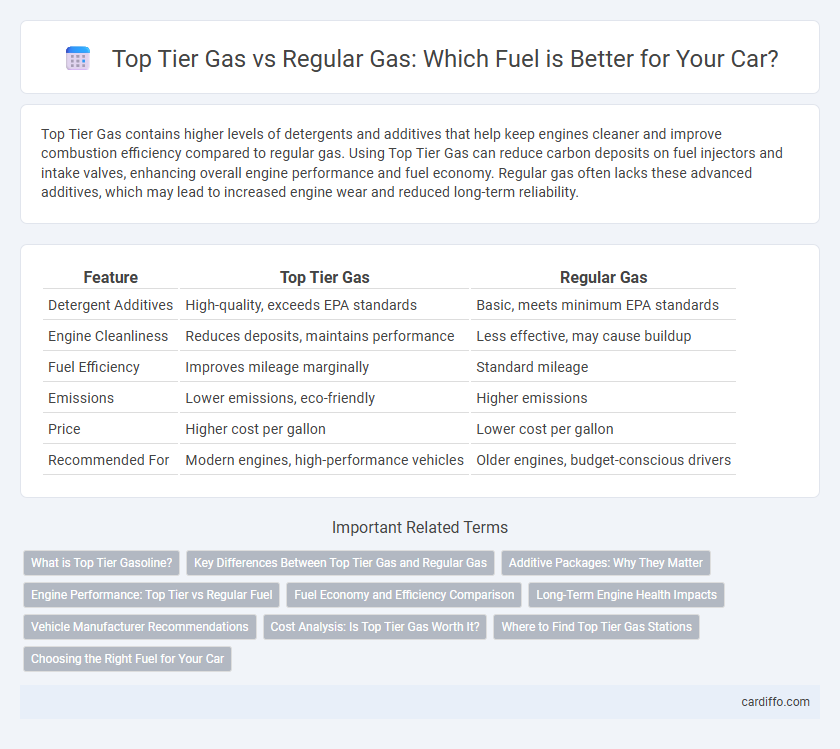Top Tier Gas contains higher levels of detergents and additives that help keep engines cleaner and improve combustion efficiency compared to regular gas. Using Top Tier Gas can reduce carbon deposits on fuel injectors and intake valves, enhancing overall engine performance and fuel economy. Regular gas often lacks these advanced additives, which may lead to increased engine wear and reduced long-term reliability.
Table of Comparison
| Feature | Top Tier Gas | Regular Gas |
|---|---|---|
| Detergent Additives | High-quality, exceeds EPA standards | Basic, meets minimum EPA standards |
| Engine Cleanliness | Reduces deposits, maintains performance | Less effective, may cause buildup |
| Fuel Efficiency | Improves mileage marginally | Standard mileage |
| Emissions | Lower emissions, eco-friendly | Higher emissions |
| Price | Higher cost per gallon | Lower cost per gallon |
| Recommended For | Modern engines, high-performance vehicles | Older engines, budget-conscious drivers |
What is Top Tier Gasoline?
Top Tier Gasoline is a higher-quality fuel formulation endorsed by major automakers to reduce engine deposits and improve performance, containing enhanced detergent additives beyond minimum EPA standards. Unlike regular gas, Top Tier fuels provide better protection for fuel injectors and intake valves, contributing to improved combustion efficiency and reduced emissions. Vehicles running on Top Tier Gasoline experience prolonged engine life and optimized fuel economy due to cleaner operation.
Key Differences Between Top Tier Gas and Regular Gas
Top Tier Gas contains higher levels of detergents and additives that enhance engine cleanliness and performance, reducing deposits in fuel injectors and intake valves compared to Regular Gas. It meets strict standards set by major automakers, ensuring better combustion efficiency and lower emissions. Regular Gas lacks these enhanced additives, which can lead to more engine buildup and less optimal fuel economy over time.
Additive Packages: Why They Matter
Top Tier Gas contains enhanced additive packages that improve engine performance by preventing deposit buildup on intake valves and fuel injectors. These additives help maintain fuel system cleanliness, ensuring optimal combustion and reducing emissions compared to regular gas with minimal additives. Choosing Top Tier Gas supports long-term engine health and fuel efficiency through superior chemical formulations.
Engine Performance: Top Tier vs Regular Fuel
Top Tier gas contains higher levels of detergents and additives that effectively reduce engine deposits, improving combustion efficiency and overall engine performance compared to regular gas. Regular fuel often lacks these additives, leading to increased carbon buildup which can cause knocking, reduced horsepower, and lower fuel economy. Engines powered by Top Tier fuel typically experience smoother operation, enhanced fuel efficiency, and prolonged engine life.
Fuel Economy and Efficiency Comparison
Top Tier gas contains higher detergent additives that help keep engine components cleaner, directly improving fuel economy by optimizing combustion efficiency. Regular gas often lacks these advanced additives, leading to increased engine deposits that reduce fuel efficiency over time. Studies show vehicles using Top Tier gas experience better miles per gallon (MPG) rates and more consistent engine performance compared to those using regular gas.
Long-Term Engine Health Impacts
Top Tier Gas contains higher levels of detergent additives that prevent carbon buildup and maintain cleaner fuel injectors, directly supporting long-term engine health. Regular Gas often lacks these enhanced detergents, leading to increased deposits that can reduce engine performance and efficiency over time. Consistently using Top Tier Gas helps preserve optimal combustion and reduces costly repairs by protecting critical engine components from wear and damage.
Vehicle Manufacturer Recommendations
Top Tier Gasoline meets higher detergent standards set by major vehicle manufacturers like Toyota, Honda, and BMW to prevent engine deposit buildup and improve fuel efficiency. Regular gas often lacks these enhanced additives, which can lead to decreased performance and increased engine wear over time. OEMs recommend Top Tier Gas to maintain warranty coverage and ensure optimal engine health and longevity.
Cost Analysis: Is Top Tier Gas Worth It?
Top Tier gas typically costs 10 to 15 cents more per gallon than regular gas, but it contains higher detergent levels that help keep engines cleaner, potentially reducing maintenance expenses over time. Studies show vehicles using Top Tier gas experience fewer deposits on fuel injectors and combustion chambers, improving fuel efficiency by up to 3%, which can offset the initial price difference. Considering long-term engine health and performance, the slight premium for Top Tier gas can result in cost savings through enhanced mileage and fewer repairs.
Where to Find Top Tier Gas Stations
Top Tier Gasoline is available at leading brands such as Shell, Chevron, Exxon, and Mobil, recognized for meeting stringent detergent standards that improve engine performance. These stations often display the Top Tier logo on their pumps or store signage, making it easier for consumers to identify high-quality fuel options. Finding Top Tier gas stations is facilitated by online tools and apps, which provide updated locations based on brand affiliation and fuel quality certifications.
Choosing the Right Fuel for Your Car
Top Tier Gas contains higher levels of detergent additives that help prevent engine deposits, improving fuel efficiency and maintaining optimal engine performance compared to Regular Gas. Regular Gas often lacks these enhanced detergents, which can lead to buildup over time, reducing horsepower and increasing emissions. Selecting Top Tier Gas ensures cleaner fuel injectors and combustion chambers, extending engine life and maximizing overall vehicle reliability.
Top Tier Gas vs Regular Gas Infographic

 cardiffo.com
cardiffo.com